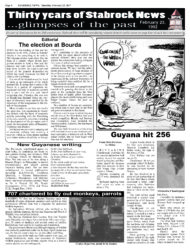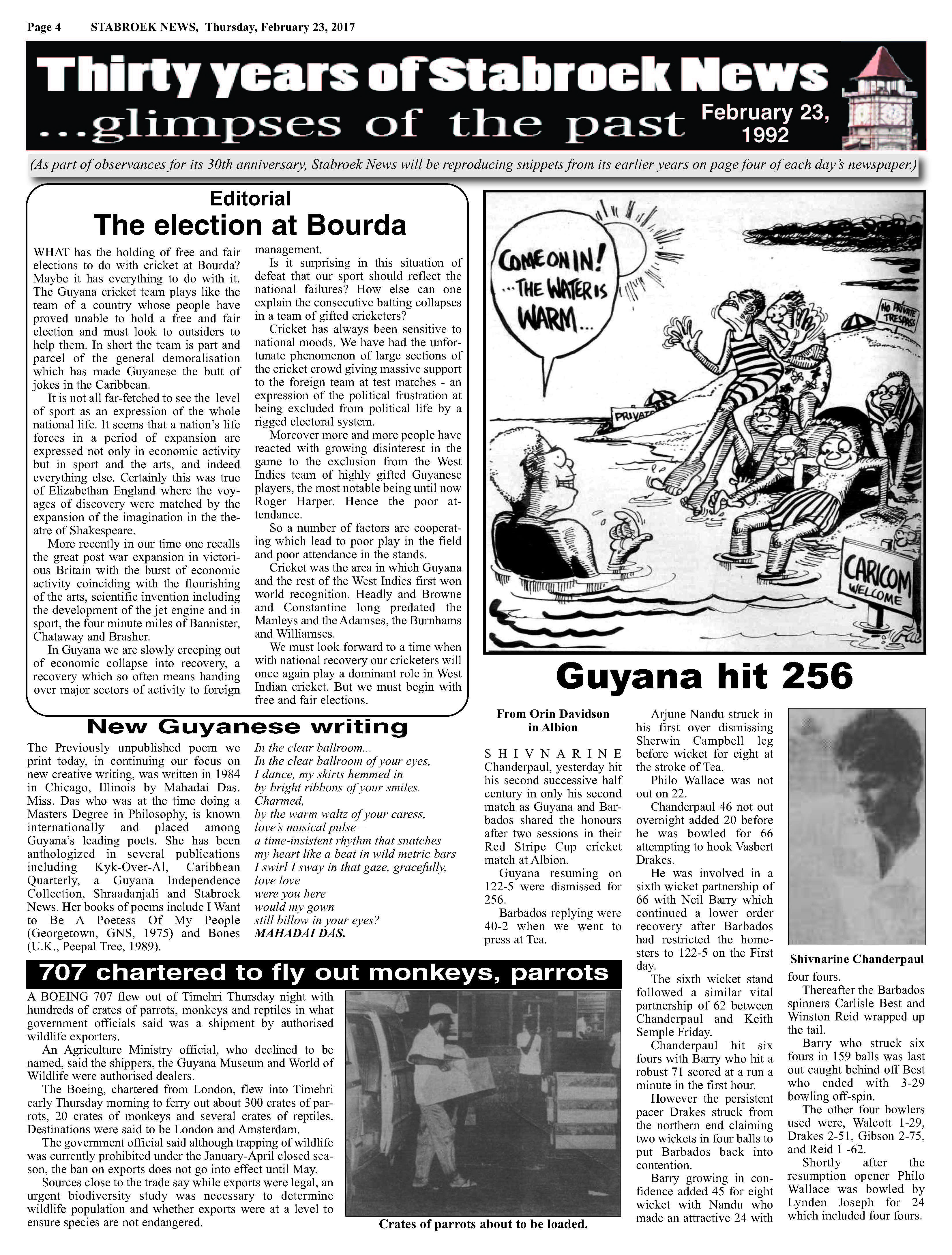The election at Bourda
WHAT has the holding of free and fair elections to do with cricket at Bourda? Maybe it has everything to do with it. The Guyana cricket team plays like the team of a country whose people have proved unable to hold a free and fair election and must look to outsiders to help them. In short the team is part and parcel of the general demoralisation which has made Guyanese the butt of jokes in the Caribbean.
It is not all far fetched to see the level of sport as an expression of the whole national life. It seems that a nation’s life forces in a period of expansion are expressed not only in economic activity but in sport and the arts, and indeed everything else. Certainly this was true of Elizabethan England where the voyages of discovery were matched by the expansion of the imagination in the theatre of Shakespeare.
More recently in our time one recalls the great post war expansion in victorious Britain with the burst of economic activity coinciding with the flourishing of the arts, scientific invention including the development of the jet engine and in sport, the four minute miles of Bannister, Chataway and Brasher.

Is it surprising in this situation of defeat that our sport should reflect the national failures? How else can one explain the consecutive batting collapses in a team of gifted cricketers?
Cricket has always been sensitive to national moods. We have had the unfortunate phenomenon of large sections of the cricket crowd giving massive support to the foreign team at test matches an expression of the political frustration at being excluded from political life by a rigged electoral system.
Moreover more and more people have reacted with growing disinterest in the game to the exclusion from the West Indies team of highly gifted Guyanese players, the most notable being until now Roger Harper. Hence the poor attendance.
So a number of factors are cooperating which lead to poor play in the field and poor attendance in the stands.
Cricket was the area in which Guyana and the rest of the West Indies first won world recognition. Headly and Browne and Constantine long predated the Manleys and the Adamses, the Burnhams and Williamses.
We must look forward to a time when with national recovery our cricketers will once again play a dominant role in West Indian cricket. But we must begin with free and fair elections.
New Guyanese writing
The Previously unpublished poem we print today, in continuing our focus on new creative writing, was written in 1984 in Chicago, Illinois by Mahadai Das. Miss. Das who was at the time doing a Masters Degree in Philosophy, is known internationally and placed among Guyana’s leading poets. She has been anthologized in several publications including Kyk-Over-Al, Caribbean Quarterly, a Guyana Independence Collection, Shraadanjali and Stabroek News. Her books of poems include I Want to Be A Poetess Of My People (Georgetown, GNS, 1975) and Bones (U.K., Peepal Tree, 1989).
In the clear ballroom…
In the clear ballroom of your eyes,
I dance, my skirts hemmed in
by bright ribbons of your smiles.
Charmed,
by the warm waltz of your caress,
love’s musical pulse –
a time-insistent rhythm that snatches
my heart like a beat in wild metric bars
I swirl I sway in that gaze, gracefully,
love love
were you here
would my gown
still billow in your eyes?
MAHADAI DAS.
Guyana hit 256
From Orin Davidson in Albion
SHIVNARINE Chanderpaul, yesterday hit his second successive half century in only his second match as Guyana and Barbados shared the honours after two sessions in their Red Stripe Cup cricket match at Albion.
Guyana resuming on 122-5 were dismissed for 256.
Barbados replying were 40-2 when we went to press at Tea.
Arjune Nandu struck in his first over dismissing Sherwin Campbell leg before wicket for eight at the stroke of Tea.
Philo Wallace was not out on 22.
Chanderpaul 46 not out overnight added 20 before he was bowled for 66 attempting to hook Vasbert Drakes.
He was involved in a sixth wicket partnership of 66 with Neil Barry which continued a lower order recovery after Barbados had restricted the homesters to 122-5 on the First day.
The sixth wicket stand followed a similar vital partnership of 62 between Chanderpaul and Keith Semple Friday.
Chanderpaul hit six fours with Barry who hit a robust 71 scored at a run a minute in the first hour.
However the persistent pacer Drakes struck from the northern end claiming two wickets in four balls to put Barbados back into contention.
Barry growing in confidence added 45 for eight wicket with Nandu who made an attractive 24 with four fours.
Thereafter the Barbados spinners Carlisle Best and Winston Reid wrapped up the tail.
Barry who struck six fours in 159 balls was last out caught behind off Best who ended with 3-29 bowling off-spin.
The other four bowlers used were, Walcott 1-29, Drakes 2-51, Gibson 2-75, and Reid 1 -62.
Shortly after the resumption opener Philo Wallace was bowled by Lynden Joseph for 24 which included four fours.
707 chartered to fly out monkeys, parrots
A BOEING 707 flew out of Timehri Thursday night with hundreds of crates of parrots, monkeys and reptiles in what government officials said was a shipment by authorised wildlife exporters.
An Agriculture Ministry official, who declined to be named, said the shippers, the Guyana Museum and World of Wildlife were authorised dealers.
The Boeing, chartered from London, flew into Timehri early Thursday morning to ferry out about 300 crates of parrots, 20 crates of monkeys and several crates of reptiles. Destinations were said to be London and Amsterdam.
The government official said although trapping of wildlife was currently prohibited under the January-April closed season, the ban on exports does not go into effect until May.
Sources close to the trade say while exports were legal, an urgent biodiversity study was necessary to determine wildlife population and whether exports were at a level to ensure species are not endangered.

